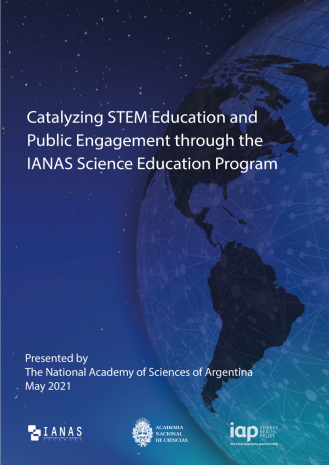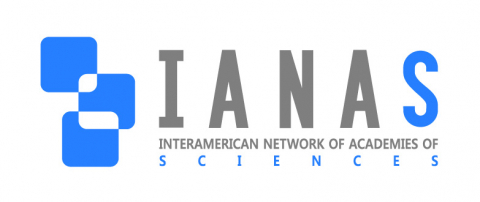Preface
The Inter-American Network of Academies of Sciences (IANAS) is a regional network of Academies of Sciences created in 2004 to support cooperation towards the strengthening of science and technology as a tool for advancing research and development, prosperity and equity in the Americas.
In 2020, the National Academy of Sciences of Argentina (ANC) proposed to IANAS the re-launching of its Science Education Program (IANAS-SEP), which had been inactive since 2017. With approval from the executive committee of IANAS, ANC convened a panel to reignite a focus on science, technology, engineering and mathematics (STEM) education and public engagement by member countries, and catalyze collaborations to share effective practice.
The COVID-19 global pandemic has underscored the critical importance of STEM skills, which includes scientific literacy, and the role that scientists, social scientists, health scientists, mathematicians and engineers can play supporting outreach and education for youth, educators, policy makers and the public.
The panel met several times virtually and collaboratively developed this statement to inspire action at the regional and local levels through the IANAS Science Education Program Focal Points. The goal of the statement, itself, is to inspire members of IANAS Academies to support and enhance early years, primary, secondary and post-secondary STEM education and public engagement activities in order to develop a scientifically literate and engaged citizenship.
In this statement, “STEM” stands for science (life, health and physical sciences), technology, engineering and mathematics, representing specific disciplines. However, the committee also used the term “STEM” in the broader context of multi/inter-disciplinary approaches in education that bring the disciplines together in relevant ways. The phrase “scientific literacy” (defined as the knowledge and understanding of scientific concepts and processes required for personal decision making, participation in civic and cultural affairs, and economic productivity is also used in the broad context of supporting literacy and skills across all STEM fields.
It is our hope that this statement will motivate and support members of IANAS Academies and SEP Focal Points to: engage in STEM education and outreach with schools, communities, and local governments and policy-makers; support organizations that are dedicated to these pursuits; and continue the collaborative approach that resulted in this statement.
Executive Summary
Science and technology are impacting and reshaping nearly every aspect of life, from leisure, schooling and work to understanding and solving pressing global problems such as pandemics and other health crises, climate change, sustainable energy, agriculture, access to clean water and more.
Scientific literacy and the skills developed through engagement with science, technology, engineering and mathematics (STEM) have never been more important. These skills include, but are not limited to, problem-solving, critical thinking, numeracy and mathematical thinking, digital skills, and communication. Exposure to STEM fields, starting young, also develops confidence and builds knowledge, both of which are required to ask questions and participate in meaningful ways in emerging social, ethical and economic debates about complex issues, such as sustainable development, artificial intelligence and genomics in our rapidly changing world.
There is also growing concern about the continued lack of diversity across the STEM research enterprise itself, public trust in STEM, and the public’s ability to decipher a growing amount of misinformation and disinformation. STEM skills are associated with higher-paying jobs in general, yet there continues to be a wage gap between men and women. These factors underscore the critical importance of educating youth in ways that help all students see STEM as accessible to them. Technological advances are rapidly changing the nature of work, underscoring the importance of ensuring students graduate with needed skills. It also points to the importance of engaging the public, including leaders and decision-makers, in meaningful ways on STEM-based issues to tackle emerging challenges and embrace opportunities with transparency. Otherwise, the risks are very high of ever-expanding social divides, escalating issues of injustice, equality, equity and diversity.
Members of IANAS Academies have a responsibility to support education and public engagement to develop STEM literacy, skills and trust. There are significant differences across the IANAS member countries with respect to spending on education, youth performance on international tests, teacher training, government investment in STEM and innovation, and economic prosperity. However, there are many similarities and much to learn from each other.
The time is right for IANAS to re-launch its Science Education Program (IANAS-SEP) and catalyze a concerted STEM education and outreach effort to achieve the following goals:
- Strengthen scientific literacy, building critical thinking skills, fostering curiosity and catalyzing lifelong interest in STEM
- Build capacity across all levels of the formal education system (early childhood, primary, secondary, and post-secondary education) by promoting inquiry-based STEM education
- Foster equality by improving equity, diversity, inclusion and accessibility across STEM fields
- Build career awareness and workforce development to support a changing global economy
- Enhance STEM education for Sustainable Development This statement sets out key recommendations to achieve these goals, thereby contributing to achieving the following vision: Members of IANAS Academies contribute to the development of informed citizens who use and engage with science, technology, engineering and mathematics (STEM) in meaningful ways and can participate in a new global economy and STEM workforce.
The following recommendations were developed by the panel for use by members of IANAS Academies to accomplish the five goals listed above. They are further de-tailed in the following sections.
Recommendations to support learning in and outside school
- A.1 Support educator training and professional learning to build confidence in teaching STEM content knowledge and effective pedagogy.
- A.2 Support access to effective learning resources that improve STEM education.
- A.3 Build digital literacy, including computational thinking, amongst students and teachers.
- A.4 Involve scientists and engineers, including post-secondary students, industry professionals, early career academics and Young Academy members, in STEM education.
- A.5 Engage school administrators and community organizations in understanding the value of STEM education and building a culture of inquiry in their school and community, contributing to the development of a vibrant STEM education ecosystem.
Recommendations for engaging civil society
- B.1 Engage proactively with media (social media and traditional) to popularize STEM disciplines and share academic work in accessible, relevant and engaging ways.
- B.2 Engage the public through popularization events (e.g. festivals, cafes, public lectures), consultations, and community-based research activities that involve the co-creation of knowledge.
- B.3 Engage with government representatives to inform relevant policy initiatives.
- B.4 Engage with industry to understand and support their needs (e.g. research, talent development), and engage them in communication and education activities.
Finally, it should be noted that members of the STEM community, including IANAS, have always engaged with youth, educators, policy-makers and the public. However, due to existing systemic institutional barriers the importance of these outreach efforts is not always recognized. This statement underscores the critical role that IANAS’s Science Education Program must play in addressing these barriers and explicitly acknowledge the inherent importance of supporting education and community engagement. The future of STEM relies on public trust, engaged citizens and the development of diverse talent.
Download the full report Catalyzing STEM Education and Public Engagement through the IANAS Science Education Program.



